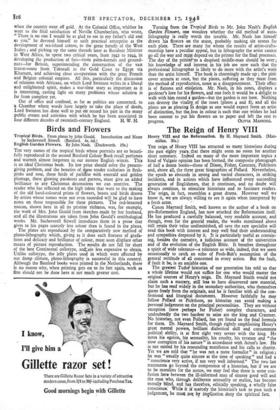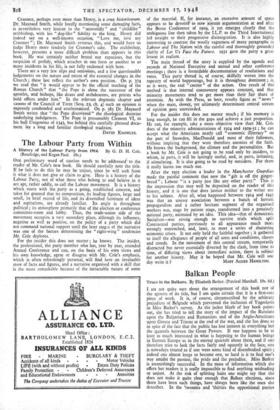The Reign of Henry VIII
Henry VIII and the Reformation. By H. Maynard Smith. (Mac- millan. 30s.)
THE reign of Henry VIII has attracted so many historians during the past eighty years that there might seem no room for another short summary. Indeed on many of the more important topics a kind of Vulgate opinion has been formed, the composite photograph of half a dozen books—those of Dixon, Fisher, Constant, Pickthorn and, above all, the three great biographies of Pollard. Nevertheless, the epoch so abounds in strong and varied characters, in striking incidents, and in actions which have influenced every succeeding generation of Englishmen, that it continues, and no doubt will always continue, to stimulate historians and to fascinate readers. The reign, in fact, resembles a great drama. However well we know it, we are always willing to see it again when interpreted by a fresh actor.
Canon Maynard Smith, well known as the author of a book on pre-Reformation England, has now attacked the Reformation itself. He has produced a carefully balanced, very readable account, and though, even for the general reader, the works mentioned above still retain their value undiminished, all save the rare specialist will read this book with interest and may well find their understanding and sympathies deepened by it. It is particularly useful as contain- ing, besides the narrative a judicious account of the. universities and of the evolution of the English Bible. It breathes throughout a spirit of wide tolerance—a tolerance so wide, indeed, that we seem occasionally to catch an echo of Pooh-Bah's assumption of the general rectitude of all concerned in every action. But the fault, if fault it be, is an amiable one.
The greatest Tudoi historian of our generation has told us that a whole lifetime would not suffice for one who would master the original sources of Henry's reign. Dr. Maynard Smith would not claim such a mastery, still less to have discovered new material, but he has read widely in the secondary authorities, who themselves quote freely from the originals, and he is familiar with all the con- fessional and liturgical documents. However faithfully he may follow Pollard or Pickthorn, no historian can avoid making a personal judgement on the principal personalities. They are without exception (save perhaps for Fisher) complex characters, and undoubtedly the two hardest to seize are the king and Cranmer. No historian, not even Pollard, has yet found us the final formula for them. Dr. Maynard Smith, though rightly empliasising Henry's great mental powers, brilliant dialectical skill and consummate political ability, is at first sight very severe with the king. He notes his egoism, his sensuality, his cruelty, his tyranny and "the slow corruption of his nature" in accordance with Acton's law. He is not misled by his resounding manifestos and his calls to charity. Yet we are told that "he was not a mere formalist" in religion; he was "usually quite sincere at the time of speaking" and had a "conscience very active, if not very well informed." The two last statements go beyond the competence of a historian, but if we are to be moralists for the nonce, we may feel that there is some con- fusion here between the ill-informed man of sincere good will and the man who, through deliberate sensuality or malice, has become morally blind, and has therefore, ethically speaking, a wholly false conscience: While it ii scarcely the historian's task to pass such a judgement, he must not by implication deny the spiritual fact. Cratuner, perhaps even more than 'Henry, is a crux historicorum. Dr. Maynard Smith, while loyally mentioning some damaging facts, is nevertheless very lenient to the " unworldly " and " childlike " archbishop, with his" dog-like" fidelity to the king. Henry did indeed say on a well-known occasion, "Love me, love my Cranmer " ; Dr. Maynard Smith 'reverses this, and would have us judge Henry more tenderly for Graruner's sake. The archbishop, however, presents a more difficult problem than appears in this book. He was certainly neither brutal nor rapacious, but the suspicion of perfidy, which attaches in one form or another to so many incidents in his life, is not fully reckoned with here.
There are a very few slips and omissions, and a few questionable Judgements on the nature and extent of the essential changes in the. Church; these last reflect the author's own position. On p. 374 we read that "it would appear to be the official teaching of the Roman Church" that "the Pope is alone the successor of the apostles, and bishops, like deans and archdeacons, are priests who hold offices under him." In the relevant dogmatic chapter and canons of the Council of Trent (Sess._,23, ch. 4) such an opinion is expressly condemded and anathematised. On p. 385 Dr. Maynard Smith writes that "the Pope discovered" the .theological doctrine underlying indulgences. The Pope is presumably Clement VI, in his bull Unigenisus of 1343, but behind this carefully phrased docu- . ment lay a long and familiar theological tradition.
DAVID KNOWLES.



































 Previous page
Previous page